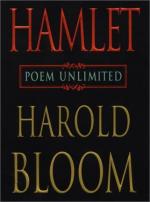|
This section contains 1,632 words (approx. 6 pages at 300 words per page) |

|
SOURCE: "Promethean Narcissism," in Partisan Review, Vol. LI, No. 1, 1984, pp. 155-58.
In the following essay, Molesworth discusses the roles of Freudianism and theology in Bloom's criticism.
In the last three decades, literary critics have struggled to retain their field as the center of cultural understanding. Criticism has been a hybrid, unstable amalgam since the rise of a mass readership. Not surprisingly, the recent struggle has seen criticism try to strengthen and clarify itself by mergers with other disciplines and subjects. From popular culture to structural linguistics, the nets of literary analysis have been flung far and variously. What has increased the extraordinary complexity of this phenomenon is that everywhere literary criticism searched, it found another discipline equally mired in self-doubt and in the "problematic of language." All the disciplines—philosophy, psychoanalysis, Marxism, social science—felt the crisis of interpretive confidence caused by several factors, chiefly the question of...
|
This section contains 1,632 words (approx. 6 pages at 300 words per page) |

|


